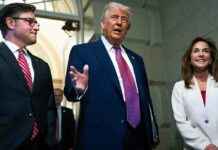Crypto investor Nicholas Pinto recently attended a gala dinner hosted by President Donald Trump at Trump National Golf Club in Potomac Falls, Virginia. The event was held for individuals who had spent the most money on Trump’s meme coin, $TRUMP, in a contest that took place on May 22, 2025. The price of the $TRUMP coin experienced a significant drop of 16% just hours after the gala, where a total of $148 million was spent by the elite crowd to secure their spots.
The gala was promoted as “the most exclusive invitation in the world,” and it saw the attendance of 220 guests, including crypto influencers, industry executives like Sandy Carter of Unstoppable Domains, and former NBA star Lamar Odom. However, not everyone left the event impressed. Nicholas Pinto, a 25-year-old attendee, expressed disappointment with the food and beverage offerings at the gala. He mentioned that the food was subpar, and he was only offered water or Trump’s wine, which he didn’t drink. Pinto also noted that Trump made a brief appearance, interacting mainly with the top 25 guests, before leaving after just 23 minutes without engaging with the majority of attendees.
Despite the opulence on display at the gala, with attendees showcasing luxury items like Richard Mille watches, the atmosphere was described as more subdued than expected. Many guests were observed checking their phones during dinner to monitor the price movements of the $TRUMP coin. The event also attracted protests outside the venue, with signs condemning “Crypto Corruption” and labeling Trump as a traitor. Lawmakers and regulators expressed concerns over the involvement of the Trump family in meme coins, with potential implications for regulatory bills like the GENIUS Act.
The presence of Chinese-born crypto mogul Justin Sun, the top holder of $TRUMP, raised further eyebrows due to his ongoing Securities and Exchange Commission fraud charges. Sun, who holds over $22 million in $TRUMP and $75 million in another token, praised Trump for his support of the crypto industry at the gala. The event’s political implications extended to Capitol Hill, where lawmakers like Rep. French Hill highlighted the challenges posed by Trump’s crypto ventures. The dinner also sparked discussions on potential provisions to prevent presidents and senior officials from profiting off crypto ventures while in office, directly targeting Trump’s stablecoin USD1.
The controversy surrounding Trump’s crypto ventures has the potential to impact the stability of the stablecoin market and the development of digital payment systems in the U.S. Major banks are reportedly exploring the issuance of a digital dollar to compete with existing stablecoins, pending regulatory clarity. The White House attempted to distance Trump’s personal activities from official government affairs, emphasizing that the gala was a private event. However, concerns remain regarding the transparency of attendee lists and the offshore platforms used by top coin holders.
As discussions on stablecoin regulation continue in Congress, the future of the GENIUS Act hangs in the balance. Senate Democrats and Republicans have introduced competing provisions that could influence the bill’s passage and the broader cryptocurrency landscape in the U.S. Despite the challenges and controversies surrounding Trump’s crypto empire, White House officials remain optimistic about the potential for bipartisan support in regulating stablecoins and creating a framework for the industry’s growth.

















